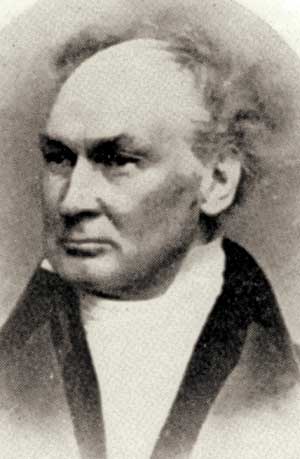Richard Fletcher
Richard Fletcher
(1788–1869)
Lawyer, Massachusetts Representative, and Massachusetts Supreme Court Justice
Richard Fletcher was born in Cavendish, Vermont, on January 8, 1788, the fifth of nine children. His father, Dr. Asaph Fletcher, was a physician and prominent politician of Leicester, Massachusetts, and Cavendish. His mother was Sarah “Sally” Green, daughter of Jonathan and Rebecca Green of Chelsea, Massachusetts.
Fletcher grew up in Cavendish, where he attended the local schools and received a classical education, learning the rudiments of English, Latin, French, Greek, and Hebrew; logic; rhetoric; natural history; geography; delineation; arithmetic; algebra; art of surveying; navigation; astronomy; botany; and natural philosophy. He entered Dartmouth College at 14 and graduated in 1806 with the highest honors.
From 1806 to 1808, he taught school at the Salisbury Academy in New Hampshire and then became the principal. In 1809, he began studying law with Daniel Webster, who was in Portsmouth, New Hampshire. After that, Fletcher was admitted to the New Hampshire bar in Rockingham County in 1811. He began his law practice in Salisbury, New Hampshire, but later moved to Portsmouth, where he quickly established a reputation for reliability. He had a natural instinct for circuit work that attracted an ever-increasing professional connection.
In 1819, Fletcher moved to Boston, Massachusetts, to expand his professional connection. He was admitted to the Suffolk County bar in 1820 and, a year later, opened his law office. However, as he was still the senior counsel on several important cases in the New Hampshire courts, he continued to represent those cases until judicature or closure. He was considered one of the last famous New Hampshire lawyers.
Once established in Boston, Fletcher took his place among the leading Massachusetts lawyers with a comprehensive command of law, which he gained through avid reading habits. As he began practicing law, his reputation as a powerful orator with elegant diction, bright thought, and keen repartee emerged.
Though he never studied mercantile (commercial) or maritime law specifically, especially law of marine insurance, his knowledge was considered profound. His greatest success was as a jury lawyer, where he spoke in a conversational style and the facts he presented usually resulted in a conviction.
In 1836, Fletcher was elected to the 25th Congress as a Whig representative for the 1st District of Massachusetts. His congressional biography is listed among many notables representing what is now the 8th District of Massachusetts, including Daniel Webster, John F. Fitzgerald, John F. Kennedy, and Thomas P. O’Neill Jr. While Fletcher took this nomination seriously and represented Massachusetts well, he considered his time in Washington unbearable. His upbringing was religious, so the common use of profanity and immoral living left him shocked and dismayed. He considered the experience as “forced contact” and declined re-nomination.
Fletcher was one of the founding fathers of the American Statistical Association and was elected the association’s first president in December of 1839. He held the office until January of 1846. His signature is the first of 25 on the original constitution of the American Statistical Association, which was adopted on December 11, 1839.
Fletcher earned a doctorate of laws degree from Brown University in 1839, from his alma mater—Dartmouth College—in 1846, and from Harvard University in 1849. His portrait hangs on the walls of Dartmouth College with other eminent alumni, benefactors, and college officers. He was active in many benevolent enterprises and bequeathed more than $100,000 to Dartmouth College. Also, from 1848 to 1857, he served as a trustee to the college.
Fletcher was appointed a judge of the Massachusetts Supreme Court on October 24, 1848, but resigned on January 18, 1853, giving as his reason that he found his judicial duties so unremitting as to leave no time for reading or thinking on any other subject. He returned to the bar for a short time before retiring from practice in 1858.
Fletcher grew up in the Baptist church and had an acute sense of religious responsibility that influenced his social and professional contacts. He joined the Federal Street Baptist Church in 1830 and remained an active, influential, and respected member. For several years, he was the Sunday school superintendent, and then taught a large young men’s Bible class. According to The New England Historical and Genealogical Register, “He was at one time elected a deacon of the church, but after thanking his brethren for the confidence in him, which their votes implied, he declined the honor on the ground that he, unfortunately, had not one of the prominent qualifications for a deacon: He was not the husband of one wife.” Although he never married, Fletcher was attached to all his nieces, nephews, and cousins. He aided many with financial expenses for their education. He also left his personal library of 2,600 volumes to the Town of Cavendish.



















I am the social historian and genealogist from the Cavendish Historical Society. Thank you so much for this wonderful biographical story of Richard Fletcher. The story of the whole Fletcher family was written in our Volume One of Families of Cavendish.